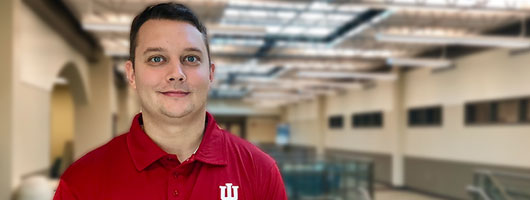 Pictured | Cory Iwaszewski | M.A. Communication Studies (B.A., Indiana University South Bend, 2016) | South Bend, Indiana (hometown)
Pictured | Cory Iwaszewski | M.A. Communication Studies (B.A., Indiana University South Bend, 2016) | South Bend, Indiana (hometown)
Club Affiliation | IU South Bend Graduate Student Association of Communication Studies (vice president)
Communication Studies | COMM
P Prerequisite | C Co-requisite | R Recommended
I Fall Semester | II Spring Semester | S Summer Session/s
- COMM-C 501 Applied Quantitative Research Methods in Communication Studies (3 cr.) The course is designed to offer an opportunity to examine, assess, and conduct quantitative research that employs communication theory and qualitative research methods as a means to test theory in applied settings and/or as a means to applied ends (i.e. problem-solving policy analysis).
- COMM-C 502 Applied Qualitative Research Methods in Communication Studies (3 cr.) Inductive (data-to-theory) approach to knowledge, and associated sequential and non-sequential methods for studying communication in applied everyday situations, e.g. friendships and other close personal dyads, families, small groups, organizations, and public, media, historical, computer mediated, or health-related contexts.
- COMM-C 503 Applied Learning Project (3 cr.) P: Permission by the M.A. in Communication Studies program coordinator. An applied learning project that provides students with a culminating education experience which gives them the opportunity to apply their knowledge of communicative processes to real life organizational problems, and provide the opportunity to produce a body of work reflective of their abilities that they can use in seeking employment.
- COMM-C 525 Communication Pedagogy (3 cr.) Exploration of theories, methods, and problems related to communication pedagogy. Topics will include instructional strategies, diversity in the classroom, philosophies of pedagogy, and ethical issues.
- COMM-C 528 Group Communication and Organizations (3 cr.) This seminar-format course examines the ways in which informal groups and communication networks facilitate a variety of organizational processes (i.e. socialization, diffusion of innovation). Emphasis is placed on developing theoretical understanding of informal groups in organizations as well as on methodological issues involved in studying communication networks in organizations.
- COMM-C 531 Media Theory and Criticism (3 cr.) A course organized primarily around theories and critical strategies commonly considered within the broad category of contemporary criticis-it utilizes primary theoretical texts to introduce students to a variety of methodologies employed in analyzing media messages, and emphasizes the application of theoretical frameworks in the analysis of specific media texts.
- COMM-C 537 Postmodern Culture (3 cr.) C: Graduate student status. This course examines representations in mass media and culture in order to evaluate and explore how values and beliefs of modernity and postmodernity are constructed, and reflect or in-part counteract with each other. It aims to analyze principles and assumptions from the representative theories of modern and postmodern cultures.
- COMM-C 544 Advanced Relational Communication (3 cr.) An introductory course in interpersonal communication. Applications of communication theory/research in such areas as relational culture and relationship development. Includes a scholarly project on a real relationship, and applications of research to areas such as pedagogy and couple/family therapy.
- COMM-C 597 Thesis (3 cr.) P: Permission by the M.A. in Communication Studies program coordinator. Applied Communication students who choose the thesis option will identify a research topic and develop it under the guidance of the student's thesis director. The thesis topic will be related to the field of applied communication in its foci and method.
- COMM-C 599 Independent Study (1-6 cr.) This course provides students with the opportunity to synthesize and apply knowledge acquired through course work and professional experience into a completed research project in applied communication. Students will work independently on a topic/issue of choice under the guidance of graduate faculty.
- COMM-J 522 Political Communication (3 cr.) Examination of the role of rhetoric in public discourses, policies, and practices in the U.S. Students will study the rhetorical dimensions of electoral politics and protests while also considering how particular texts participate in broader struggles to define political practice, citizenship, and national identity in America.